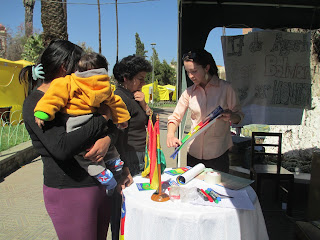One of the great things about life in general, but
especially life here in Cochabamba, is that I find myself doing things I never
would have thought of before. Since the
50th year anniversary of Martin Luther King Jr.’s “I have a Dream” speech just
passed, I think it timely to remember the value of active non-violence and
seeking to resolve conflicts (that involve deep hurts and pains) with
communication that is also non-violent. While
I am a fan of non-violence, I am a novice anxious to learn more, and an
opportunity came up in July to participate in a non-violence workshop.
One of the current FMS missioners here in Cochabamba has
experience with a non-violence workshop constructed by Pace Bene, a group from
the U.S. Using that text and her
experience with Pace Bene, she was asked to give a 2 day workshop to the group
of Franciscan friar students and I got to help her out in the process, which taught
me a lot.
We started out the workshop asking everyone to light a
candle and tell the rest of the group what the meaning behind their name is. It
was beautiful to see a little bit of the story behind each person by a simple
telling of why they have the name they have. I saw pride in each person’s
identity, a connectedness with their past and with their families. In sharing
the story behind my name, I also felt a sense of pride and joy in who I am and
where I come from. It felt good to have the opportunity to share and be heard.
There were many exercises that challenged us on what is
violence and what is non-violence in our own perceptions. When one comes to
recognize all the violence within oneself, it seems a daunting task to transform
it. To help, we talked about some techniques to help as well as looking at the
example of non-violent people we know or know of.
Since we also talked about interpersonal relations and
communication on one of our radio shows, I will share a tip that has served
useful to me recently in non-violent communication and that is - clarifying
perceptions - starting with asking questions. We may feel angry or hurt by
something said when what the other person meant to communicate was totally
different, so it’s important to clarify.
Of course another value or principle that helps in
communication is honesty and August was Justice and Peace’s month to focus on
honesty. August 17th is Bolivia’s flag day and the Justice and Peace
movement decided about 10 years ago to use Flag Day as an entry-way to promote
that Bolivians be more honest, since the flag should represent the values and
principles of a country’s people. Each year they chose a different theme, like
against bribery, or in favor of fair wages and dignified work, or paying taxes
instead of buying from the black market, or promoting honesty in government
officials etc.
This year the theme was honesty in education: in the family,
in schools and universities, and in other parts of society like religions. Of
course we all could be more honest in all parts of the world and not just in
August, but it’s a good excuse to bring it up at least once each year. We had some
great national folkloric music at our tent in a plaza this year on Flag Day,
and were able to talk with lots of people about the honesty campaign. Talking with
people about the cheating, copying and lying that happens with students at such
an early age, I was reminded how grateful I am for the Honor Code I signed at
my university and how much it was an expectation in the culture of the
institution, which I think makes it a little easier to abide by, but it also
made me wonder…what happens when honesty is not an expectation? Food for thought! Until next time, I hope you are well!
5 things I’m thankful for today: the unexpected rain falling
on the roof and on the dry arid land; having been given another year of life;
homemade yogurt I bought from a French brother; getting to sleep in on a
Sunday; meeting new babies.



No comments:
Post a Comment